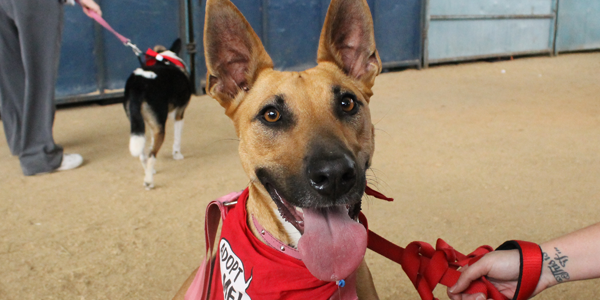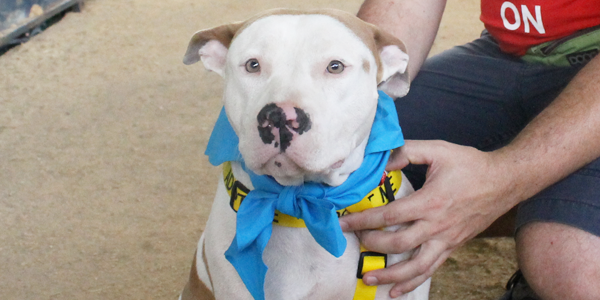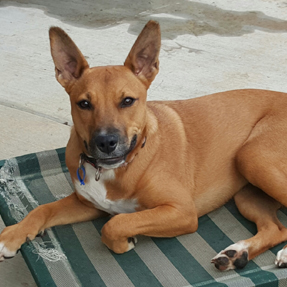One of our special RSPCA Foster dogs
One of our dedicated RSPCA Foster Carers
One of our long-term RSPCA Foster dogs, Babe
Do I get a choice of what animals I foster?
Yes, within reason. Foster carers can specify what type of animals they would prefer e.g. large dogs only, dogs and puppies, special needs cats, just kittens. However, we can’t match a person to particular breeds e.g. “I only want to foster pugs”.
Do I need to have a certain fence height to foster bigger dogs?
Carers have to have the required fence/gate height for the size of dog they would like to foster. Most medium, large and giant breed dogs will require the lowest section of the fence or gate, to be at least 5-6ft. All puppies and toy and small breed dogs will require at least 4ft. Though many dog owners will cite the case of their own Great Dane or Cattle Dog, who lived securely behind a 3ft fence for many years, we have to be cautious and stipulate a minimum fence height that we expect to securely hold a variety of dogs within that size range. So even though you’re keen to foster Labradors, Staffies, Border Collies, German Shepherds, Boxers and Mastiffs, if the lowest section of your fence is 4ft, you’re more likely to be offered Fox Terriers, Maltese Terriers, Chihuahuas and puppies.
How long will I have my foster animal for?
While some animals only need a week or two in foster, others require long term care - which in some cases has reached up to a few years. Carers can specify what duration of care they are able to provide.
What do I have to provide for my foster animal?
RSPCA Qld will try to provide everything you need e.g. food, bedding, travel crate, veterinary care, toys, leads and collars, hydrobath and grooming appointments. Of course we rely on donations for all of these items. Many carers do tend to buy raw bones for their foster dogs and supply their own kitty litter. At times our food supplies don’t arrive on time, so carers must be prepared to cover the gap by buying a quality food product from the supermarket.
What happens if I want to go on holiday?
Carers let the Foster Care Team know when they are heading on holidays and are unavailable to take an animal. If you have a long-term foster care animal, they can be returned to the shelter or placed with another foster care family, just for the time that you are away. Carers cannot board their foster animals at commercial boarding kennels, take their foster animals on holiday with them or leave the animal at a friend or family member’s home (wherever the animal is staying would require a property check and whoever was looking after the animals would need to attend Basic Foster Care Training). Please give as much notice as possible to the Foster Care Team when returning your long-term foster animal for a holiday, particularly during peak periods. Some regional areas cannot accommodate animals so they will need plenty of time to make alternative arrangements during your absence.
Unless you have a long-term foster animal, please do not agree to take an animal and then expect to drop them back for a weekend. If you know you are going away for a couple of days during the expected foster period, it’s really better that we place the animal with another foster carer and organise an animal for you when you are more available.
Is it a problem that I have my own animals?
As long as you meet local council regulations for the number of dogs and cats that you’re allowed and as long as all of the animals get on well together, you can certainly foster an RSPCA animal when you have animals of your own. Please ensure that your own pets are up to date with their vaccinations, intestinal worming and flea control treatments.
Your own dogs need to be well-mannered, sociable and likely to accept a new animal into their home environment. If your dog has shown aggression, “intimidating” behaviours (e.g. growling, mounting, snapping, baring teeth), fear and nervousness around other animals or is extremely boisterous, it would unlikely be suitable for the program. Before a carer takes an adult dog for foster, we ask that you bring your own dog(s) into the shelter for a “meet and greet” to ensure that they seem compatible. Carers can also specify what type of foster animals are likely to best suit their own animal family e.g. small breed dogs only, female dogs, older adult cats.
Is it a problem that I have children?
Many of our foster carers have children. It can be very beneficial for our animals to get accustomed to kids. Depending upon the animal that needs to be fostered, however, we may avoid placing them in a home with children of a particular age. Please understand that we can only use a child’s age as a guide to what type of animal is suited to your family. Your children may be very experienced and confident with animals, but it’s not possible to consider these things for every individual foster family. Before a carer takes an adult dog for foster, we ask that you bring your children into the shelter for a “meet and greet” to ensure that they’re compatible.
We work full time, is that a problem?
As long as you give plenty of attention to your foster animal(s) before and after work, your animals should cope with your absence. Many of our foster carers have full time jobs and manage to exercise and interact with their animals around their other commitments. Carers are also asked to specify the average amount of time they are at home each day, so that we can find a suitable foster home for those animals who might need more company.
How frequently will I be asked to foster?
This is highly variable. Natural disasters, puppy mill raids and cat breeding season can dramatically increase the number of animals that need to be fostered. We appreciate people’s patience and stress the importance of having a team of foster carers ready and able to take on animals at short notice.
If you have 6ft fences, no other dogs and no children, you are more likely to meet the criteria for an adult foster dog. People who have low fences, one or more of their own dogs, children under 13 years of age and who only want to foster small breeds of dog, are less likely to be routinely contacted. Obviously a large seizure of small breed dogs by the RSPCA Inspectorate would change this demand significantly and we would hope to engage those suitable foster carers quickly.
In what areas can I foster care for the RSPCA?
We have shelters at Wacol (Brisbane), Dakabin (north of Brisbane), Toowoomba, Kingaroy, Gympie, Noosa, Bundaberg, Townsville, Cairns and adoption centres at Rockhampton and the Gold Coast. You will be required to collect and drop off animals from our facilities and return for emergency and routine veterinary treatments, so it is advisable that carers live no further than an hour’s drive from their nearest RSPCA Qld shelter or adoption centre.











